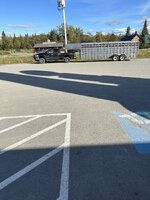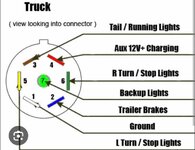ON TRAILERS
####
Usual comment: I don't know anything about anything. You probably don't want to listen to me.
So figured I'd post a few things on this, as yesterday I found myself lying on my back in a bunch of mud and snow, attempting to fix my trailer wiring. I say "Attempting" because trailer wiring is always broken. It is the Natural State Of Being for trailer wiring: completely knackered all the time.
I'm not going to be that guy that pulls a chatGPT and gives a bunch of pro/con bullet lists. I don't currently own a vast selection of horse trailers, and never will. I own one beat-up ancient rig that I bought a long time ago before prices went nuts. So I'll keep my comments limited to my experience around that trailer. If you want to know about other trailers, go talk to real ranchers.
This Is My Trailer
It's a 20ft bumper pull stock trailer, 5 1/2ft wide. It's from 1979, and rusty. It goes down the road, mostly. Sometimes.
What I like:
- These old skinny trailers (horses can't turn around in because the trailer is too skinny) are nifty in that they track exactly behind your truck. If you are trying to avoid potholes, or drive between ruts, these trailers will track exactly where your truck tires are. This is handy.
- Because they are skinny, you don't need any fancy towing mirrors or anything. Just your regular truck mirrors work fine. Hook up and go.
- Because it's 20ft stock trailer, you have either a four-horse straight load, or a 3 horse slant-load. More importantly you can be useful and help move a few cows for your rancher neighbour when they are short a trailer, and then you don't look as much like a dude, and might be invited to a branding or get some tips on how to deal with your dumb horses. (Note: Make sure your truck can handle 3-4 horses + tack, if you are considering filling it full of ponies and heading out. That's a heavy load for the mountains, and you want to be able to stop.)
- Dual axle: Critical (in my opinion) because if one of your tires goes flat, you don't have a catastrophic failure. Just pull off to the side of the road, and change the tire.
- Price was right: I don't like going into debt over hobbies. Financial stress is a thing. I didn't want a trailer payment hanging over my head. 80/20 etc. Something that works was all I cared about, and this thing has done splendidly, but sure isn't much for looks.
What I don't like:
- It's steel, so it's heavy to tow. And rusts bad.
- It's old, so everything breaks. Did I mention it's rusty?
- Stock trailers don't come with things like tie rings or tack rooms. I drilled holes and added U-bolts for tying. And added a divider for a ghetto tack room.
Picture during construction. It has plywood on the front now. And yes, that's a quad ramp, for you eagle-eyed types - Perfect fit.
- No door locks (usually). I solved this by drilling a hole through the man-door, and the rear swing door, and putting bike locks through those holes. Won't prevent a determined jerk, but keeps everything generally honest.
- These days some horses have never seen a skinny trailer - They are only used to big ones they can turn around in. The concept of backing out of a trailer is foreign to some horses, so you might need to do a bit of training to get them used to stepping up/down and backing out of blind stuff.
- Stock trailers are quite open. So they are loud, windy, and dusty for your horses. (Or can be). My tack and stuff gets dusty from the gravel roads.
How To Haul Horses
I'm not going there. This is like wading into an argument about religion: Everyone thinks they are right, and things get heated.
All I can say, as a complete amateur, is have good, non-slip footing for your critters. Beyond that, do what you want, but remember the saying "When in Rome..." Personally I just copied what I've seen working cowboys do, but I'm sure someone out there will yell at me for doing it wrong.
Driving Tips
Just a few things I figured were worth mentioning:
- Drive slow. Not ancient grandpa slow, but just generally slow. This keeps your horses happy, as sudden movements throw off their balance and stress them out. "Slow is smooth" as they say. And a horse going down because of crap driving is a nightmare that I hope to never deal with.
- Your gas mileage will suuuuuuuuck badly. And whatever your "Gas remaining" calculation on your dash says, its wrong, and will change its mind at the worst time. Carry a jerry can with you. (Ask me how I know.)
- Plan your route in advance. When you have a trailer on your rig, you can't turn around at the usual spots you can with just your truck. I'm paranoid about this, because I'm not really a trailer guy - I do it because I have to, not because I enjoy it. I'm super nerdy about scouting driving routes via google earth and other satellite maps. Look for flat, wide spots.
- In the same manner, consider just pulling off the forestry road into the ditch and park there (pick a flat spot), assuming you can do that in your locale. Lately I've taken to finding a trailhead location, and then just driving passed it until there's a decent flat spot in the ditch. I'll pull over and park/tack up there. Then there's no worries about turning radius, your jack bottoming out, etc. People may eyeball your rig, but to me that's less of a headache than getting stuck or having to back out of a nasty turnaround.
General Comments
Some random stuff in no particular order:
- A trailer box on top of your hitch is a Good Thing. Put stuff in there like electrical tape, wire cutters,
zip ties, 30ft of 10ga wire, 2x tire pressure gauges, a scissor jack, sockets, and a big f****** breaker bar. This way you have all the gear you need to (1) temporarily fix your wiring, and (2) change a tire on the side of the road in a blizzard. See below.
- Your trailer lug nuts, due to the laws of the universe, are going to be on the trailer lugs REALLY right. Too tight for your truck's lug wrench. And unless you have a giant piece of old chain link fence post sitting around to use as a snipe, you're going to have a problem. Carry something heavy duty to deal with those lug nuts.
- Your wiring, again due to the laws of the universe, will always be wired incorrectly, on both your truck wiring harness, and your trailer wiring harness. So anticipate having to rewire everything. And, even more fun: When you go to your hardware store to get replacement wiring stuff, it wont matter what brand/make you buy - It's all from the same factory in China, and they are all coded incorrectly. All of them. Every. Single. One.
So, here's your wiring diagram for your truck,
as you're crouched down by your rear bumper, with the plug cover lifted and pinching your fingers, and you're staring at the plug with a WTF look on your face.
Wire all your stuff this way, and you'll be good to go. (No, I will not negotiate on this. Wire things this way. I'm evening adding an attachment in case imgur pulls a photobucket in the future.)
- Old trailer wiring always breaks. Always. And usually at the worst times. In an effort to be kind to your future self, sometimes it's just easier to pick a day in late June/Early July, and intentionally take that day to rip out the janky wiring that the previous 8 owners scabbed on, and rewire the trailer properly yourself. Harbour Freight is your friend here, and a combination of a 4-way harness, plus some 10 or 12 gauge wires for your Brake and 12v/ACC wires go a really long way here.
And the best part here is that when THAT setup breaks, because it will, you will know how everything is configured. Oh, and you will only swear at yourself, instead of the 8 other owners that you KNOW purposefully rigged up those wires to break on you.
Best for Last - A Public Service Annoucement
I picked this up from another rokslider (I can't remember who, I'll edit this and add it, sorry amigo) and
@PNWGATOR :
Stash an emergency knife in your truck, that is ONLY ever to be used for cutting ropes.
If things get western and a horse goes down, you need to cut ropes
fast. No screwing around wondering "Oh where did I put that thing again?" Have this knife in the same place, all the time, and stage it intentially for those "In case of fire, break glass" moments. And here's to hoping you'll never need to use it.
Anyway, that's all.





